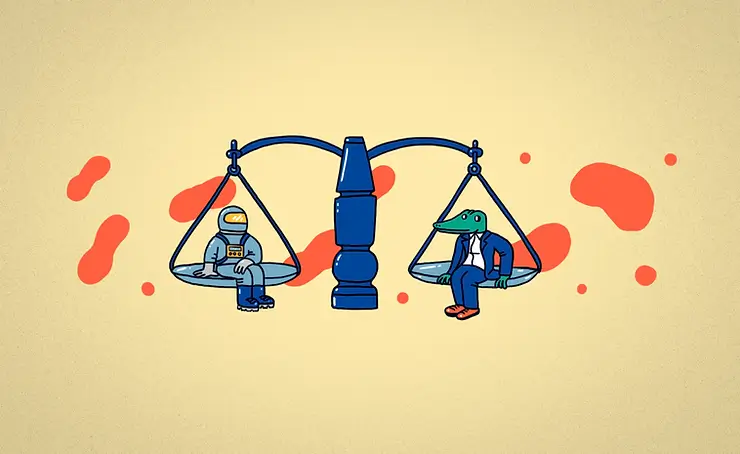In mid-September of 2022, the U.S. Department of Justice (DOJ) announced a series of changes to its policies related to corporate compliance, misconduct, and criminal investigations. (Check out the full transcript of the speech here, as well as the released memorandum). With these changes comes a greater emphasis on encouraging companies to self-report misconduct and disclose evidence earlier, as well as more specifics on individual wrongdoing and repeat offenses.
4 Takeaways from the DOJ compliance changes
So what does all of this mean for your company? Below, we’ll be summarizing four primary takeaways from this upcoming change.
1. A greater focus on individual accountability
The DOJ’s “top priority for corporate criminal enforcement” is to hold individuals who commit corporate crime accountable for their behavior. Consistent with this priority, the revised DOJ guidance encourages corporations to come forward early with information regarding employees that may have committed a crime in order for prosecutors to seek criminal charges against individuals much sooner. “We need to do more and move faster,” said Deputy Attorney General Lisa O. Monaco in her September remarks.
In other words, corporations seeking to receive cooperation credit are expected to disclose information and produce evidence about potentially-culpable individuals in a timely manner. In many cases, corporations may hold off on disclosing this type of information in order to pursue their own internal investigation, but this behavior was explicitly called out by Monaco as detrimental to the DOJ’s investigation: “Delayed disclosure undermines efforts to hold individuals accountable. It limits the Department’s ability to proactively pursue leads and preserve evidence before it disappears.”
It’s noted that corporations who intentionally do not disclose relevant information in a timely manner will receive a reduction or denial of cooperation credit.
2. A more nuanced approach to historical corporate misconduct
There were a handful of adjustments made to how the DOJ takes prior instances of misconduct into account when assessing corporate compliance issues, now with a greater emphasis on context. Here are some high-level takeaways:
- “The most significant types of prior misconduct” will be previous criminal resolutions in the U.S. and actions involving the same individuals who were previously involved in wrongdoing.
- “Dated” misconduct — i.e. historical misconduct that occurred more than five to ten years ago (for civil/regulatory resolutions and criminal resolutions, respectively) — will be “accorded less weight” in current investigations by the DOJ.
- The DOJ will determine whether current conduct has the same “root causes” as prior misconduct. This includes looking at the leadership team in place during both acts.
- Corporations in highly-regulated industries will be considered in comparison to its industry peers “to determine if the company is an outlier.”
- In the case of an acquisition of a company with a prior history of compliance issues, the DOJ will give special consideration to whether the acquiring company has an effective compliance program and strong company culture.
3. A call for voluntary disclosure of wrongdoing
The DOJ also pointed out that programs that formally outline and incentivize voluntary self-disclosure processes (like the voluntary disclosure program for violations of the Foreign Corrupt Practices Act [FCPA] or the Antitrust Division’s Leniency Program) will become standard for every department that prosecutes corporate crime. Monaco also noted that corporations that self-disclose, cooperate, and remediate misconduct will not be sought out for guilty pleas by the Department of Justice (absent aggravating factors). Additionally, the DOJ will not require an independent compliance monitor for the corporation if they’ve implemented and tested an effective compliance program.
“Simply put, the math is easy,” Monaco summarizes, “voluntary self-disclosure can save a company hundreds of millions of dollars in fines, penalties, and costs. It can avoid reputation harms that arise from pleading guilty. And it can reduce the risk of collateral consequences like suspension and debarment in relevant industries.”

4. Companies with good compliance, company culture, and compensation systems will be considered in the investigative process
The Department of Justice has noted that they have been encouraged by recent trends of company cultures that reject wrongdoing for profit’s sake. Monaco specifically called out companies that enacted compensation policies like clawback provisions that held individuals who contributed to criminal misconduct financially accountable for their actions, and she noted that prosecutors will take these policies into consideration when evaluating a company’s compliance program.
How can you stay on top of these new guidelines? With excellent company culture and compliance
When it comes to misconduct within an organization, it’s never a matter of “if,” it’s a matter of “when,” as Ethena’s CEO Roxanne Petraeus has pointed out. One major way to prepare for inevitable misconduct? Excellent compliance training that arms employees with the knowledge and resources they need to address and report misconduct when they see it in the workplace.
Looking for a compliance training solution that gives teams the resources they need to address and report misconduct when they see it? Ethena’s best-in-class training platform makes training and reporting accessible through stellar and inclusive content. Talk to a member of our team, or request a sample of our training today!









